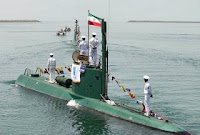 By Aaron Klein
By Aaron Klein
WorldNetDaily 


![]()
![]()
Iran has been pressing Syrian President Bashar Assad and his Baath party to open a front of continued confrontations targeting the Israeli border, according to informed Israeli security sources.
Assad is looking for ways to deflect attention from the continued waves of uprisings targeting his regime, said the security officials.
The security officials said Iran is particularly concerned Assad's rule may be threatened by the internal uprisings, which it has blamed on Muslim Brotherhood allies. Iran has been pressuring the Syrian leader to continue confrontations with the Jewish state, which could involve the Iranian-backed Hezbollah in Lebanon.
The last time Hezbollah provoked border clashes with Israel, when the group stormed the Jewish state's borders in 2006, the result was the a 33-day confrontation known as the Second Lebanon War.
The security officials said that while Iran has been pushing Syria toward a confrontation with Israel, Turkey has been pushing Assad toward reforms as a way for the Baath party to remain in power.
The information comes as Assad's regime has been implicated in a series of deadly border clashes that rocked Israel's borders Sunday as well as three weeks ago.
The clashes have been widely reported by news media, which have been largely casting the events as popular revolts planned on social media.
Earlier this week, Syrian opposition parties claimed Assad's government paid Syrian farmers $1,000 each to rush the Israeli border last Sunday.
Yesterday, a Syrian government-run newspaper stated marches to the border will continue regularly.
In a highly controlled police state like Syria, the recent border clashes could not take place without at least the tacit approval of the government, security officials state. The information also comes as Iran’s semi-official Fars news agency reported yesterday Tehran sent submarines to the Red Sea in a move that could anger Israel.
The information also comes as Iran’s semi-official Fars news agency reported yesterday Tehran sent submarines to the Red Sea in a move that could anger Israel.
"Iranian military submarines entered the Red Sea waters with the goal of collecting information and identifying other countries' combat vessels," Fars said.
In February, immediately following the downfall of Egyptian President Hosni Mubarak, a U.S. ally who strongly opposed Iran, the Egyptian military allowed the passage of two Iranian warships through the Suez Canal in a move widely seen as a turning point in the Egyptian-Iranian relationship.
It was the first time Iranian warships transited the Suez since the 1970s.
Fatah to Launch New Intifada?
If the reports of a new Syrian confrontation with Israel are confirmed, it would mark the latest bad news for the Jewish state.
WND broke the story that Fatah, the party of Palestinian Authority President Mahmoud Abbas, held a series of local meetings to discuss the possibility of launching a large-scale uprising, or intifada, targeting Israel, according to Fatah sources present at the meetings.
The Fatah meetings were focused on how to best capitalize on violent Arab riots that gripped Israel last weekend, including the storming of the Jewish state's borders with Syria, Lebanon and the Gaza Strip.
Also, the meetings discussed how to best use the uprisings in the larger Arab world to launch a campaign that would target Israel.
Fatah sources said the meetings were held by the local Fatah leadership in the cities of Jerusalem, Ramallah, Hebron and Nablus.
The sources said the meetings did not reach any conclusion, but most Fatah leaders present favored an intifada that would focus on protests and rock-throwing in the guise of a popular uprising.
The Fatah leaders felt such a campaign would aid the Palestinian Authority's bid to unilaterally declare a state at the United Nations Security Council and General Assembly in September.
Dimitri Diliani, a spokesman for Fatah, refused to confirm or deny the content of the Fatah meetings.
Diliani told WND that calls for a third intifada "come from people frustrated with the very long peace process that has not translated into any results on the ground."
"These ideas will continue to gather support as long as the peace process is dormant," he said.
Diliani told WND that only Fatah's executive committee, and not local leaders, could take the ultimate decision of launching an intifada.
"There are no local Fatah factions who could even manage such a campaign by themselves," he added.
According to the Fatah sources present at the meeting, the local leaders strongly presented the case for a sustained pressure campaign aimed at Israel's Jewish communities in the West Bank, territory the Palestinians claim for themselves.
Among the ideas discussed were staging mock trials of individual leaders of the Jewish communities in the West Bank and eastern Jerusalem.
"All focus must be on attacking the settlement project diplomatically, politically and legally," said one Fatah source.
Related Links
 Iranian subs to the Red Sea – riposte for UN nuclear watchdog's indictment - DEBKAfile
Iranian subs to the Red Sea – riposte for UN nuclear watchdog's indictment - DEBKAfile Syria to be condemned in UN Security Council - Australian Broadcasting Corporation
Syria to be condemned in UN Security Council - Australian Broadcasting Corporation Israel and Syria: Tensions are mounting - International Business Times
Israel and Syria: Tensions are mounting - International Business Times Defiant Iran plans big rise in nuclear enrichment - Reuters
Defiant Iran plans big rise in nuclear enrichment - Reuters Turkey chides Assad, says doors open to refugees - Today's Zaman
Turkey chides Assad, says doors open to refugees - Today's Zaman







